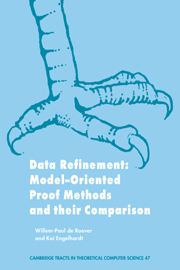Part II - Applications
Published online by Cambridge University Press: 03 May 2010
Summary
This part presents an overview of some existing formalisms for proving data refinement. We analyze for each of the selected formalisms how it relates to simulation in its various shapes (partial vs. total correctness, relational vs. predicate transformer semantics). This allows us to compare the power of these formalisms when it comes to data refinement. The reader should be warned, however, that this does not at all imply a ranking that should be used as a guideline for selecting a particular method for a development project.
In Chapters 11 and 12, Reynolds' method and VDM are described and related to the results of Part I, and in Chapter 13 this is done for Z, Hehner's method, and Back's refinement calculus. In Section 13.1 we not only introduce the Z-notation and state Z's method for proving data refinement, but also explain why the latter is equivalent, modulo notation, with the VDM method for proving data refinement as stated in Chapter 12. Consequently, Z does not introduce anything new from the point of view of data refinement, although it constitutes a considerable improvement w.r.t. the important topic of structuring specifications.
The main result of these chapters is that these methods can be considered as applications of the L-simulation principle. Back's refinement calculus is similar to the one presented in Chapter 10 in that it is based on weakest precondition predicate transformer semantics and in that its notion of simulation is a kind of powersimulation.
- Type
- Chapter
- Information
- Data RefinementModel-Oriented Proof Methods and their Comparison, pp. 255 - 256Publisher: Cambridge University PressPrint publication year: 1998

